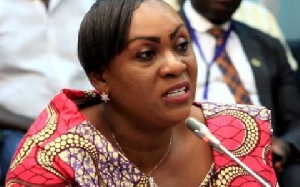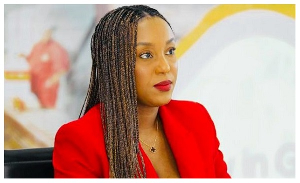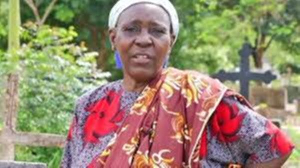The Minister for Special Development Initiatives, Mavis Hawa Koomson, says the 2017 US$ 1 million per constituency promised by the government has expired with the budget for that year.
According to her, the US$1 million was not a statutory fund like the Ghana Education Trust Fund (GETFund) and other forms of funds, so when the budget expires, the finance ends with it.
“One million per constituency, when put together for two years, it would be US$5.5 million. It is true, but I must be honest with you, as I have said on the floor of Parliament, I will repeat it here again, our funds are not statutory, so when the budget expires, it expires with the money,” she stated.
Mrs. Koomson said this while answering questions at the Meet the Press Series, organised by the Ministry of Information yesterday in Accra.
She, however, explained that the Ministry, as at 2017, did not have the development authorities in place, therefore, was unable to disburse funds to the various constituencies, as promised by the President during the 2016 campaign.
“How we spent the 2017 budget. 2017 was when the development authorities were yet not in place, and you will all bear with me that the ministry is a new ministry all together. So we were just doing preparatory works, putting up the ministry and the development authority.
“If you would remember, last year November, by this time, the development authorities’ bill was at Parliament. So we couldn’t have just gone to the constituencies to do any project, but we started with the preparatory work,” Mrs Koomson supports her assertion.
Definitely, she noted that the government would have provided the resource if there were projects ongoing, so the Ministry of Finance and Parliament would not have approved of funds for no work done, adding, “So please we don’t have that (funds) as we speak here.”
Nevertheless, the Ministry so far received GH¢1.2 billion funding from the Finance Ministry, and a sum of GH¢927 million had been spent out of the amount on the development of some 2,601 projects, including small dams, warehouses, toilets facilities, potable water and other project across the country.
The unit cost of a project like a small dam was estimated between GH¢200,000 to GH¢250,000, and warehouse, GH¢1.8 million, however, the location of the project determines the price.
She disclosed that the ministry has so far used GH¢23 million of the GH¢927 million to pay contractors, since they were to pre-finance the projects before being paid.
The Minister further gave assurance to the public that about 80 per cent of the projects that the ministry had embarked on would be completed by the end of the year.
Giving the mandate of the ministry, she said the government had identified poverty eradication, access to clean water and sanitation, agriculture transformation, eradication of inequalities and local infrastructure development as its prioritised areas.
In effect, the ministry was established to accelerate development of these priority areas through the implementation of the Infrastructure, Poverty Eradication Programme (IPEP).
The priorities set by the government are expected to contribute to the country’s achievement of the Sustainable Development Goals 1, 2, 6, 9 and 10.
Furthermore, the ministry’s core responsibility is to formulate and implement policies, plans and programmes of government priority initiatives.
The development authorities were established as the main vehicles for the implementation of the projects.
Projects being championed by the ministry include ‘US$1 million per Constituency,’ ‘One-Village One Dam, agriculture infrastructure, Water for all Project and sanitation.
She reiterated that “the object is to combat poverty in rural areas and deprived communities, stimulate community development in all constituencies, and creation of jobs, especially jobs for the youth.”
Currently, the country has been zoned into three – Northern, which consists of the Upper West, Upper East and Northern regions; Central Belt – Ashanti, Brong Ahafo and Eastern regions; Coastal – Greater Accra, Central, Volta and Western regions.
General News of Wednesday, 14 November 2018
Source: The Chronicle
‘US$1m per constituency expired with the 2017 budget’ - Mavis Hawa Koomson
Only Mahama can deliver Ghana from Nana Addo’s mess – Nii Lante Vanderpuye
0 seconds of 2 minutes, 33 secondsVolume 90%
Press shift question mark to access a list of keyboard shortcuts
Keyboard Shortcuts
Shortcuts Open/Close/ or ?
Play/PauseSPACE
Increase Volume↑
Decrease Volume↓
Seek Forward→
Seek Backward←
Captions On/Offc
Fullscreen/Exit Fullscreenf
Mute/Unmutem
Decrease Caption Size-
Increase Caption Size+ or =
Seek %0-9

















